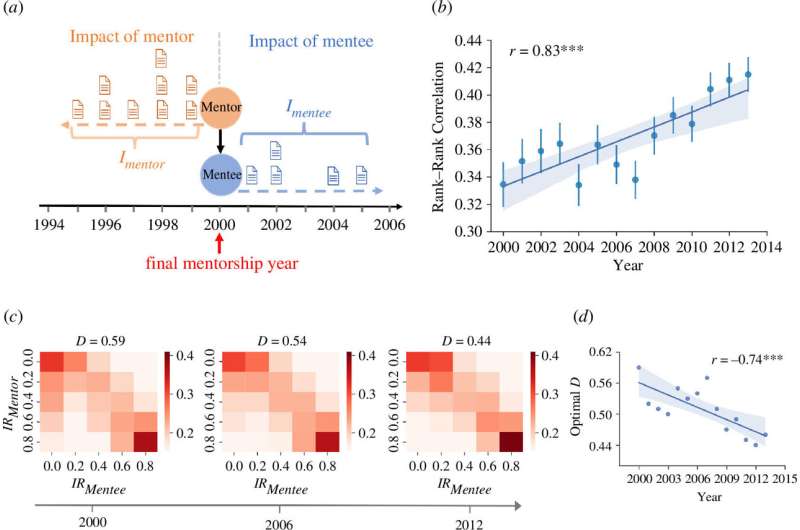August 27, 2024 report
This article has been reviewed according to Science X's editorial process and policies. Editors have highlighted the following attributes while ensuring the content's credibility:
fact-checked
peer-reviewed publication
trusted source
proofread
Researchers find academic equivalent of a Great Gatsby Curve in science mentorships

A team of economic and business researchers from Southeast University, in China, University College London and Queen Mary University of London in the U.K. has found what they describe as the academic equivalent of a Great Gatsby Curve in science mentorships.
In their paper published in the Journal of the Royal Society Interface, the group describes how they studied the mentee/mentor citation histories of hundreds of thousands of academics across 22 disciplines looking for associations between citation success of the mentors and citation success of the mentees after they went out on their own, and what they learned by doing so.
The Great Gatsby Curve, named after the main character in the F. Scott Fitzgerald novel, has come to be used to describe people who succeed economically because of the environment in which they were raised. Those who grow up with a wealthy mentor tend to become wealthy adults.
In this new effort, the researchers have found evidence suggesting that something similar happens in academia—graduate students who work with a successful mentor tend to have more success after graduation than those with less accomplished mentors. In their study, they used the number of citations as a measure of academic success.
Suspecting that mentorship can have a big impact on career success, the research team devised a way to test their suspicions. They pulled information from academic databases that allowed for comparisons of academic success between academics, then chose 245,000 pairs of mentor/mentees who worked together from 2000 to 2013 to study trends. This allowed them to compare the success (citation numbers) of mentees after they went out on their own (up to 2023), who were paired with mentors of differing degrees of success.
In the data, the team found a pattern—those mentees who had worked with oft-cited mentors tended to be cited more often in their careers. They also noted that the difference was greater for grad students than for post-docs and that working at a prestigious institution offered some protection against such disadvantages for mentees who had worked with a less cited mentor.
More information: Ye Sun et al, The academic Great Gatsby Curve, Journal of The Royal Society Interface (2024). DOI: 10.1098/rsif.2024.0173
Journal information: Journal of the Royal Society Interface
© 2024 Science X Network





















